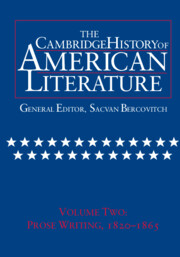Book contents
- Frontmatter
- Introduction
- CONDITIONS OF LITERARY VOCATION
- THE LITERATURE OF EXPANSION AND RACE
- THE TRANSCENDENTALISTS
- NARRATIVE FORMS
- 1 Establishing National Narrative
- 2 Local Narratives
- 3 Personal Narratives
- 4 Literary Narrative
- 5 Crisis of Literary Narrative and Consolidation of National Narrative
- Chronology
- Bibliography
- Index
4 - Literary Narrative
from NARRATIVE FORMS
Published online by Cambridge University Press: 28 March 2008
- Frontmatter
- Introduction
- CONDITIONS OF LITERARY VOCATION
- THE LITERATURE OF EXPANSION AND RACE
- THE TRANSCENDENTALISTS
- NARRATIVE FORMS
- 1 Establishing National Narrative
- 2 Local Narratives
- 3 Personal Narratives
- 4 Literary Narrative
- 5 Crisis of Literary Narrative and Consolidation of National Narrative
- Chronology
- Bibliography
- Index
Summary
ROMANCE, ROMANTICISM, AND THE LITERARY
In his extended works from The Scarlet Letter (1850) through The House of the Seven Gables (1851), The Blithedale Romance (1852), and The Marble Faun (1860), Nathaniel Hawthorne was the writer of prose narrative most important in establishing the kind of writing now recognized as ‘literary.’ Spurred by the success of The Scarlet Letter, Hawthorne's publishers moved to consolidate his position by reissuing Twice-told Tales (1851), collecting several of his recent sketches and tales along with some dozen previously unrepublished pieces in The Snow-Image (1851), and commissioning from him a book of mythological narratives for children, A Wonder-Book for Girls and Boys (1851 – 2, followed by Tanglewood Tales in 1853). The first year in which Hawthorne's writing provided enough income for his family to live on was 1851. Nevertheless, the gap in his career as a writer of fiction – seven years to The Marble Faun after only three years of high activity – indicates that even Hawthorne was not fully or clearly established in the role of a professional writer. His Life of Franklin Pierce (1852), written for the successful presidential campaign of his college friend, gave him access to a lucrative patronage position as American consul in Liverpool (1853–7), and with the financial security he earned from this position Hawthorne spent further years in France and Italy. These biographical facts emphasize the fragility of the newly emergent literary narrative.
Along with his college acquaintance and friend Henry Wadsworth Longfellow, Hawthorne was the figure around whom the recognition of ‘literature’ was established in the United States. Hawthorne best combines recognition in his own time with recognition in later discussions of American national literature, but Edgar Allan Poe did more to put into place the theories and perspectives that have formed the twentieth-century notion of literature.
- Type
- Chapter
- Information
- The Cambridge History of American Literature , pp. 693 - 734Publisher: Cambridge University PressPrint publication year: 1995



